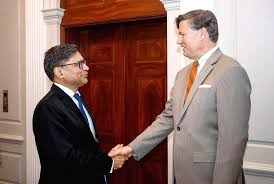Foreign Secretary Vikram Misri, US deputy secy of state meet, reaffirm ‘shared desire to maintain regional stability and peace’

In a significant diplomatic engagement underscoring the growing strategic partnership between India and the United States, Foreign Secretary Vikram Misri recently met with U.S. Deputy Secretary of State Christopher Landau. The meeting, held in Washington, D.C., reinforced both nations’ shared desire to maintain peace and stability across a complex and often volatile regional landscape.
Strengthening India-U.S. Ties at a Crucial Juncture
This high-level meeting comes at a time when the geopolitical environment in South Asia and the broader Indo-Pacific region remains fraught with challenges. India and the United States, already engaged in a multifaceted strategic partnership, used this platform to reaffirm their mutual commitment to addressing common security concerns, economic cooperation, and global challenges such as terrorism and climate change.
Foreign Secretary Misri and Deputy Secretary Landau emphasized that the India-U.S. relationship has reached a historic zenith, marked by unprecedented levels of trust, cooperation, and shared strategic vision. This meeting served as a reaffirmation of their intent to further deepen bilateral ties across multiple domains.
Shared Commitment to Regional Stability and Peace
Central to the dialogue was a focus on maintaining peace and stability in South Asia, especially amid ongoing tensions between India and Pakistan. Both leaders agreed on the critical importance of avoiding escalation and fostering dialogue. The United States reiterated its long-standing position advocating for restraint, transparency, and peaceful resolution of conflicts.
This diplomatic posture is vital given the recent incidents along the Line of Control (LoC) and other flashpoints. By emphasizing de-escalation and open communication, India and the U.S. aim to prevent conflict spillovers that could destabilize the broader region.
The meeting also touched upon the importance of multilateral frameworks that contribute to regional security, including the Quadrilateral Security Dialogue (Quad) comprising India, the U.S., Japan, and Australia. The Quad serves as a key platform to ensure a free, open, and inclusive Indo-Pacific, countering destabilizing influences while promoting cooperation in areas like maritime security and humanitarian assistance.
Advancing Economic and Technological Cooperation
Beyond security, the discussions between Misri and Landau highlighted the expanding economic partnership between the two countries. Both sides expressed enthusiasm about advancing initiatives that facilitate trade, investment, and technological collaboration. The U.S. Deputy Secretary stressed the need for fair and reciprocal market access, which would unlock new growth opportunities for businesses and workers on both sides.
India’s burgeoning technology sector and startup ecosystem were recognized as vital engines for innovation, making collaboration in tech and talent development a priority. Both countries aim to leverage their strengths in digital technologies, artificial intelligence, and clean energy to drive sustainable development.
In this context, the meeting underscored progress on the India-U.S. Strategic Trade Dialogue, which is expected to address trade barriers and enhance regulatory cooperation. This dialogue will play a key role in removing bottlenecks and facilitating smoother bilateral trade relations.
Cooperation in Strategic Initiatives and Multilateral Platforms
The dialogue also provided a platform to advance several strategic initiatives and enhance cooperation in areas of mutual interest. The TRUST (Transforming Relationship Utilizing Strategic Technology) initiative was discussed as a critical framework to deepen collaboration in emerging and sensitive technologies, including cybersecurity and defense capabilities.
Additionally, both leaders expressed support for expanding cooperation within multilateral forums such as the India-Middle East-Europe Economic Corridor (IMEEC) and the I2U2 group, comprising India, Israel, the UAE, and the U.S. These platforms aim to foster regional connectivity, infrastructure development, and economic integration.
The meeting highlighted the importance of continued defense collaboration, including joint exercises, technology sharing, and capacity building, which enhance interoperability and mutual trust between the two militaries.
Broader Global Challenges and Future Outlook
The scope of the India-U.S. partnership extends beyond regional concerns to address pressing global challenges. Both countries reaffirmed their commitment to tackling climate change through clean energy collaboration and sustainable development projects. Additionally, cooperation in counterterrorism, public health, and people-to-people exchanges remain integral to the partnership.
Looking ahead, this meeting between Foreign Secretary Misri and Deputy Secretary Landau sets a positive tone for the future of India-U.S. relations. It signals a joint resolve to work closely in safeguarding peace and stability, promoting economic prosperity, and contributing constructively to the global order.
Conclusion
The recent engagement between India’s Foreign Secretary Vikram Misri and U.S. Deputy Secretary of State Christopher Landau is a clear testament to the strength and maturity of the India-U.S. strategic partnership. Their shared desire to maintain regional stability and peace, coupled with ambitious plans for deeper economic and technological cooperation, reflects a forward-looking vision rooted in mutual respect and common interests.
As both countries continue to navigate complex regional dynamics and global challenges, such high-level diplomatic exchanges play a crucial role in building trust, enhancing cooperation, and ultimately fostering a more stable and prosperous Indo-Pacific region.






